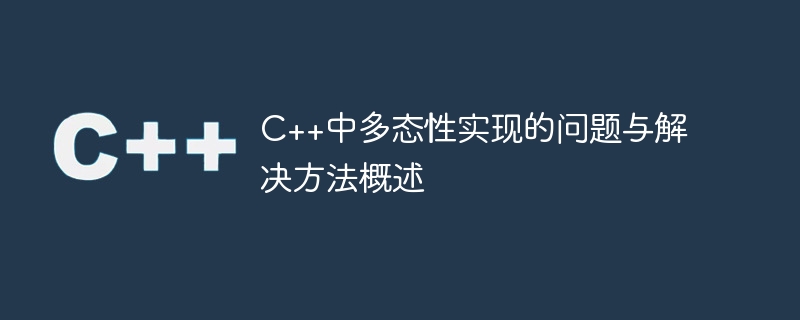Home >Backend Development >C++ >An overview of problems and solutions for implementing polymorphism in C++
An overview of problems and solutions for implementing polymorphism in C++
- PHPzOriginal
- 2023-10-09 14:51:341221browse

Overview of problems and solutions for polymorphism implementation in C
Introduction:
In C, polymorphism is an important feature. Allows us to be unsure of the true type of an object at compile time, and perform corresponding operations based on the actual type at runtime. However, implementing polymorphism will also face some problems. This article will briefly introduce these problems and provide some solutions, while providing specific code examples to help readers better understand.
Question 1: Object slicing
Object slicing refers to the phenomenon of assigning a derived class object to a base class object. When we assign a derived class object to a base class object, only the parts of the derived class object that are the same as the base class object will be copied, causing the unique members and methods of the derived class to be lost. This can cause bugs and unexpected behavior in your program.
Solution:
In order to avoid object slicing problems, we usually use pointers or references to handle polymorphic objects. We point the base class pointer or reference to the object of the derived class, so that we can retain the unique members and methods of the derived class. When using pointers or references, you need to pay attention to releasing memory correctly to avoid memory leaks.
Code example:
class Shape {
public:
virtual void draw() const {
cout << "Drawing a shape." << endl;
}
};
class Rectangle : public Shape {
public:
void draw() const override {
cout << "Drawing a rectangle." << endl;
}
};
void drawShape(const Shape& shape) {
shape.draw();
}
int main() {
Rectangle rectangle;
drawShape(rectangle); // 正确示例
shape.draw();
return 0;
}Problem 2: Undefined behavior
In the implementation of polymorphism, when we call a virtual function, the compiler only knows that it is a base class A pointer or reference to an object whose true type cannot be determined. This means that if we call non-existent members or methods in a derived class through virtual functions, it will lead to undefined behavior and cause the program to produce unpredictable results.
Solution:
To avoid undefined behavior, we need to be more careful when designing and using polymorphism. First, the virtual function should be overridden explicitly using the override keyword, so that the compiler can help us check whether the virtual function of the base class is correctly overridden. Secondly, good design principles should be followed and the relationship between each inherited class should be reasonably arranged to avoid unnecessary confusion and conflicts. Finally, when necessary, you can use the dynamic_cast operator to check the actual type of the object to avoid calling non-existent members or methods.
Code example:
class Animal {
public:
virtual void makeSound() const {
cout << "Animal is making sound." << endl;
}
};
class Dog : public Animal {
public:
void makeSound() const override {
cout << "Dog is barking." << endl;
}
};
class Cat : public Animal {
public:
void makeSound() const override {
cout << "Cat is meowing." << endl;
}
};
void performSound(const Animal& animal) {
if (const Dog* dog = dynamic_cast<const Dog*>(&animal)) {
dog->makeSound();
} else if (const Cat* cat = dynamic_cast<const Cat*>(&animal)) {
cat->makeSound();
} else {
animal.makeSound();
}
}
int main() {
Dog dog;
Cat cat;
Animal animal;
performSound(dog); // 输出:"Dog is barking."
performSound(cat); // 输出:"Cat is meowing."
performSound(animal); // 输出:"Animal is making sound."
return 0;
}Conclusion:
Implementing polymorphism in C is a powerful and flexible feature, but it also needs to be used with care to avoid encountering object slicing and unresolved Define behavior. By correctly handling pointers or references to polymorphic objects, using the override keyword to rewrite virtual functions, and properly designing inheritance relationships, we can make better use of polymorphism and improve the scalability and maintainability of the program.
Summary:
This article briefly introduces the problems and solutions of polymorphism implementation in C, covering the two main problems of object slicing and undefined behavior. By providing specific code examples, we hope that readers can have a deeper understanding of the concepts and application techniques of polymorphism and apply them in actual programming. By properly applying polymorphism, we can better organize and manage code and improve program flexibility and reusability.
The above is the detailed content of An overview of problems and solutions for implementing polymorphism in C++. For more information, please follow other related articles on the PHP Chinese website!

